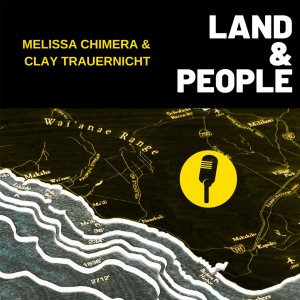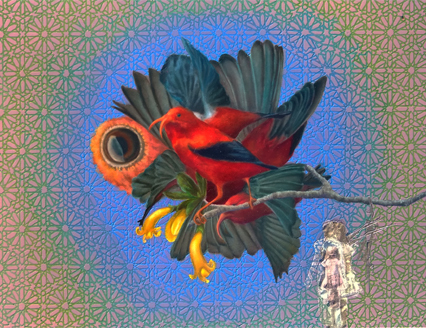Land and People
Hawai`i conservationist and artist Melissa Chimera and University of Hawai`i Mānoa fire and ecosystems scientist Dr. Clay Trauernicht talk with land protectors in Hawai`i and the Pacific about the places they cherish through their professional and ancestral ties. We paint an intimate portrait of today’s land stewards dealing with global crises while problem solving at the local level. Brought to you by the Cooperative Extension Program at the University of Hawai`i at Mānoa’s College of Tropical Agriculture and Human Resources. Music ”Raindrops” courtesy Lobo Loco and ”Bale Wengei” courtesy Joshua Rostron.
Episodes

Friday Feb 28, 2025
Friday Feb 28, 2025
Keith Robinson of Kaua`i comes from a multi-generational, large land-owning family who has been in Hawai`i for more than 200 years. The Robinsons (descendants of the Sinclairs) owned and operated sugar plantations and cattle ranches across many thousands of acres in Kaua`i, including the entire island of Ni`ihau. A self-described "black sheep", Keith's varied interests range from Ni`ihau defense operations, to ranching and native plant restoration. His passion is as a one-man operation in growing, planting and helping to sustain in some cases rare plant species across Robinson-owned land. He shares his unusual upbringing, as well as his controversial views related to public versus private stewardship of rare species.

Friday Feb 14, 2025
EP 50 Kaua`i kupuna Sabra Kauka on beauty and importance of Nu`alolo Kai
Friday Feb 14, 2025
Friday Feb 14, 2025
Aunty Sabra Kauka is founding member and past-president of grassroots nonprofit, Nā Pali Coast `Ōhana, dedicated to preserving natural and cultural resources of the Nā Pali Coast State Park. Her work and that of the volunteers centers around the ancient Hawaiian village, Nu`alolo Kai, once a thriving, rugged and isolated community on the north shore of Kaua`i. Sabra shares with us the wide scope of her travels and experiences across the continent to Alaska and then back home to Hawai`i where she has held anthropology and journalism positions, and taught Hawaiiana and cultural protocols for decades.

Friday Jan 31, 2025
Friday Jan 31, 2025
Jeremie Makepa is a captain for the Kaua`i Fire Department for more than 2 decades in fire prevention side and as a fire fighter. His is a multi-generational Hawaiian homesteading family and most recently he serves as a land steward with the non-profit `Āina Alliance, formed in 2021. His work and that of his partners is award-winning: he’s been recognized by the Council for Native Hawaiian Advancement with an E Ola Empowering O`iwi Leadership award for his “community partnerships rehabilitating areas that have been abused and neglected" particularly in Anahola, on the north shore of his home island.

Friday Jan 17, 2025
Friday Jan 17, 2025
Melissa and Clay pivot this season to the oldest island in the Hawaiian archipelago--Kaua`i. They revisit one of their earliest LAND & PEOPLE interviews with retired botanist Steve Perlman, of the Kaua`i Plant Extinction Prevention Program (PEPP). Steve talks about his love of Pacific island peoples in remote places, his start with the National Tropical Botanical Garden, the thrill of discovering new plants, and climbing the highest sea cliffs in the world to save the last of a species.

Friday Jan 03, 2025
Friday Jan 03, 2025
William (Willy) Kostka is a long-time conservationist and islander who was born and raised on the island of Pohnpei, in the Federated States of Micronesia. In 1998, he helped found and became the first Board Chairman and Executive Director of the Conservation Society of Pohnpei, and then transitioned to lead the Micronesia Conservation Trust for 17 years. He has helped to bridge, fund and formulate island ecosystem stewardship and marine protected commitments from islands and countries across the nearly 7 million km2 of Pacific Ocean. Willy speaks to us about growing up in Pohnpei, as well as the traditional land tenure and agroforestry systems. He speaks to his new role in helping to promote sustainable development projects in energy and water resource care as the Director of Micronesia Regional Office of the Pacific Community.

Friday Dec 20, 2024
Friday Dec 20, 2024
Ann Singeo is a founding member and Executive Director of Ebiil Society, a non-profit organization that promotes environmental education and conservation in Palau. She holds a Masters Degree in Communications for Social Change from University of Texas in El Paso which enabled her to learn from and work with subsistence communities across Micronesia. For two decades, she has helped to facilitate stewardship learning by young people in Palau in both science and traditional knowledge. Students and researchers are involved in everything from giant clam and sea cucumber restoration, dugong and turtle monitoring, fish weir restoration, marine debris removal, to working with women fishers in sustainable harvesting and traditional medicinal healers in learning Palauan customary land and marine practices.

Friday Dec 06, 2024
Friday Dec 06, 2024
Craig Santos Perez is a poet, essayist, university professor, and American publisher born in Mongmong-Toto-Maite, Guam (Guåhan) Island, formally considered a U.S. territory. His literary distinctions are many. In 2023 he won the National Book Award for poetry, 2015 American Book Award and the 2011 PEN Center USA Literary Award for Poetry. He immigrated to California when he was fifteen, thus sparking his life-long exploration into what it means to be of a tropical and culturally rich place, and then separated from his CHomorro homeland. His poetry and scholarship settles into the question of identity, navigating place and also challenges many of the contemporary notions of geography and American poetry traditions. Find out more about FROM UNINCORPORATED TERRITORY [ÅMOT] here, and watch his acceptance speech and his reading of the extraordinary poem "ginen ars pasifika" here.

Friday Nov 22, 2024
Friday Nov 22, 2024
Part II of a two-part conversation with Jermy Uowolo, who was born and raised on the island of Fais in the State of Yap, in the Federated States of Micronesia (FSM). Jermy's background is as a Micronesian cultural practitioner, anthropologist, historian and Hawaiian ecosystem restoration specialist for the Mauna Kea Forest Restoration Project. He shares with us the value of gathering and recording knowledge from Micronesian elders and culture keepers, as well as the challenges and opportunties of his own immigration story--from Yap to Guam and eventually Hawai`i Island.

Friday Nov 08, 2024
Friday Nov 08, 2024
Part I of a two-part conversation with Jermy Uowolo, who was born and raised on the island of Fais in the State of Yap, in the Federated States of Micronesia (FSM). He received his bachelors degree from University of Hawai`i at Hilo and served as a conservationist for the Watershed Alliance in Hawai`i, the Mauna Kea Forest Restoration Project and is the President of the Micronesians United – Big Island (MU-BI) organization in Hawai`i. His knowledge spans the remote atols of his home state, to Guam, Palau, the Mariana Islands and beyond. He shares with us the prehistory and the recent immigration, military and colonial struggles in places like the Marshall Islands, and the challenge of preserving cultural practices and knowledge.

Friday Oct 25, 2024
Friday Oct 25, 2024
Archie Kalepa Is a retired ocean safety officer who served the County of Maui for 32 years. Archie is not only a world renowned ocean safety expert and dedicated advocate for Hawaiian culture with decades of experience in rescue operations, cultural preservation and team leadership. He is a pivotal leader in West Maui, as one of the first responders on-scene after the Lahaina fires organizing the ocean delivery of needed food, water and essentials to people stranded and desperate for help. While his big wave surfing and ocean rescue accolades are many, he tells us about how helping and connecting people to the land, ocean and each other--especially in times of crisis--are among his most difficult and rewarding experiences.

What Would You Do to Protect the Places You Love?
Land and People asks protectors of our vanishing, native places what they do every day to protect the places they love. We explore the common bonds and different approaches in our intimate portraits with the people of Hawai`i and the Pacific.






